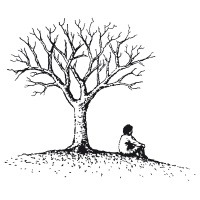 Let us have a moment to ponder the philosopher. His title tends to conjure images of stuffy anchorites bent before desks of dusted verbiage, of old men waxing lyrical on what is right and what is real. These associations are not entirely inaccurate: we paint such images from faded portrayals of classical philosophers, as caricatures intent on capturing the eccentric wisdom of history’s greatest thinkers. This is not to say these hackneyed depictions bear any resemblance to philosophers in general, however—and to this the philosopher is to take no offence: the masses picture him so just as they picture the chemist perpetually goggle-clad and peering into combustible test tubes. As much as anyone else, the philosopher ought to remember that our conceptions of foreign disciplines are more often amusing than they are offensive, and more often ludicrous than they are credible.
Let us have a moment to ponder the philosopher. His title tends to conjure images of stuffy anchorites bent before desks of dusted verbiage, of old men waxing lyrical on what is right and what is real. These associations are not entirely inaccurate: we paint such images from faded portrayals of classical philosophers, as caricatures intent on capturing the eccentric wisdom of history’s greatest thinkers. This is not to say these hackneyed depictions bear any resemblance to philosophers in general, however—and to this the philosopher is to take no offence: the masses picture him so just as they picture the chemist perpetually goggle-clad and peering into combustible test tubes. As much as anyone else, the philosopher ought to remember that our conceptions of foreign disciplines are more often amusing than they are offensive, and more often ludicrous than they are credible.
We might nonetheless explore the public image of the philosopher for curiosity’s sake. Atop his many perceived qualities sits his isolation from his scholarly brethren; we appear to conceive of him somehow distanced from the scientist, the historian, and the poet. This disparity is for some based in philosophy’s purported lack of substance, manifest in its scholars’ deficiency in anything by the way of economic utility. What benefits are we to claim in ruminating the nature of knowledge, or the mysteries of human consciousness? What is to be gained in theorising right from wrong, in deciphering real from unreal, in plucking the beautiful from the grotesque? Such judgements question academia’s worth when it is no longer a lucrative exercise. What use is the Ivory Tower, after all, if it cannot be dismantled and sold for its parts?
Others sequester philosophy for less hostile yet equally uninformed reasons, its persistent interest in the supernatural being a ready example. Some hear the term ‘metaphysics’ and think not of Hume’s theory of causation or Plato’s theory of the forms, but of some sort of mystical pseudoscience concerned with arcane knowledge. Here the philosopher is pictured playing the role of the incense-burning lunatic gazing wildly into the ether, the shaman to his tribe of befuddled followers. With each of these associations the ground no doubt shakes as revered philosophers squirm in their coffins, a flagrant insult to a discipline very much dedicated to the pursuit of truth. The person of philosophy is an ever-questioning, ever-rational nit-picker with a voracious thirst for the right and good, and there are very few who could match him in his reluctance to accommodate superstition. He is right to begrudge such misunderstandings of his pursuits.
Misconceptions do not account for every explanation of the philosopher’s isolation, however: we might consider his natural dissatisfaction with our conceptions of truth. He asks questions where others do not, and fidgets awkwardly in the presence of facts others are keen to espouse. This is not to discredit the captious natures of his scholarly brethren—surely a good scholar of any sort is a pedantic one—but rather to highlight the expansiveness of the philosopher’s general inquiry. In the face of ‘concrete’ evidence he would pester the scientist on the limits of empirical knowledge; to the mathematician he would question the basis for necessity; and with the artist he would ponder the nature of art and its nebulous qualifications. He is prepared to relinquish his every assumption through fear of taking something for granted, the sort of behaviour that leaves him vulnerable to accusations of being over-inquisitive. In response to such statements as ‘X is true’ the philosopher would no doubt question the nature of X and then the nature of truth—and some consider this inappropriate and useless at best and distracting and harmful at worst.
This alleged over-inquisitiveness might justify the philosopher’s abovementioned reputation. If his only perceived role in society is that of the twittering sceptic it is no wonder he is deemed a nuisance, and indeed an unnecessary one. His incessant questioning threatens our security and dilutes our claims to truth. It leaves us with an icy feeling of nakedness as we are laid bare to the perils of uncertainty. It is this tentative environment that propagates the philosopher’s false associations with the supernatural: some mistake his scepticism for a desire to displace science with fantasy, misreading his intent to refine our search for truth as a desire to divert it. In each of these views it is clear that the philosopher is marked an enemy of human enterprise, as an enemy of the truth. This may raise questions regarding our own intentions: do we honestly crave the truth, or are we compelled simply by answers that happen to fit the bill? Any such commitment of sincerity would necessitate the ever-questioning philosopher as a valuable tool, not discard him as any sort of hindrance. That which has been validated can only remain so as long as it endures scrutiny, and that must surely include the scrutiny presented by philosophical arguments.
It is important that we do not conceive of the philosopher in purely negative terms. In truth he does more than expose the faults of neighbouring disciplines—he paves the very way for their advancement. Many would dispute this claim and offer as a rejoinder a reproachful comment regarding philosophy’s alleged obsolescence: it is a field superseded by science. It would, however, take but the briefest glimpse into the past to realise the falsity of such animadversions; for asking questions about the present has always been the first step to approaching the future. Method and experiment costs time and money—resources which are not themselves inexorable—and the determination of the most fruitful itinerary requires the direct application of philosophy, whether in the form of logic, metaphysics, or simple critical thinking. The same is true beyond the realms of science: law is based ultimately on ethical code, the ponderings of moral philosophers; art swings gracefully from the discipline of aesthetics; and the living of a happy life requires philosophy of the most personal sort, that of self-contemplation. We would do well to remember that philosophy works always in humanity’s interest, for there is nothing more natural to it nor more conducive to its success.
Let us conclude our brief consideration in constructing an understanding of the philosopher he would not resent. In doing so we ought to respect both his utility in tempering others and his quintessential importance to innovation. In analogy we might liken him to the human conscience. The brain in an exceptionally powerful machine capable of performing extraordinary feats, and in this it mimics modern science. With the use of our brains we hold the capacity to store vast amounts of information, to decode intricate puzzles, and to make accurate predictions of the future. Alone, however, this remarkable machine remains just that—a machine. The moment it longs to become more than a mere set of empirically adequate models it requires something else, namely consciousness. Consciousness allows for self-awareness, self-reflection, and self-projection—capacities brought to academia by the philosopher. He safeguards humanity from its own hubris while also allowing it to envisage its possible futures. He is what reminds it of its limitations, and what urges it to marvel at what lies beyond them. Though there is no doubt that the philosopher is isolated from his scholarly brethren, he is nevertheless their trusted friend and cohort—he is where they began, and where they must all eventually end.
George P. Simmonds
Oxford Brookes University


